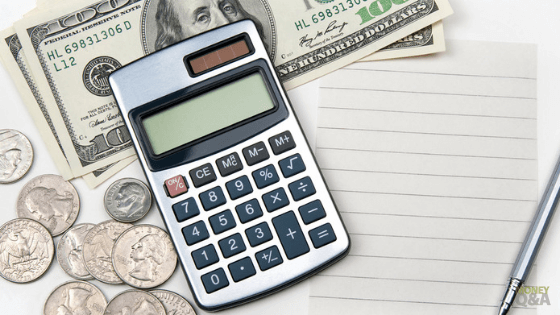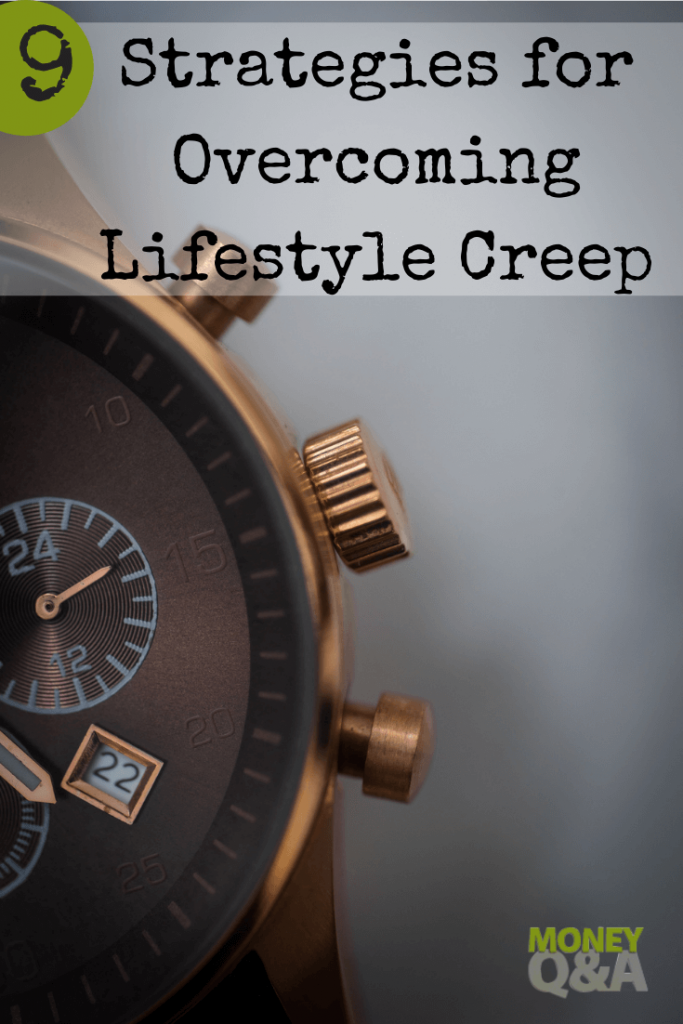
When you start making more money through your business, job, or investments, the next thing that typically happens is you start spending money more freely because you can finally afford to do so. There is a danger of lifestyle creep.
Unfortunately, our desire to disregard our budgetary restrictions comes with a serious downside. We won’t make much progress in our financial goals if we’re too busy spending money and living at our means.
It’s nice to have a little cash to wave around, especially if that wasn’t always the case. Nevertheless, you really need to rein it in, or you’ll end up practicing lifestyle creep. What’s that? In a nutshell, it dwells on the logic that an increase in income should automatically lead to an increase in spending habits. This dangerous ideology can ruin your financial health and keep you stuck in the rat race of working to pay the bills.
The thing is, it’s only human nature to want to improve your social and economic standing. However, in today’s society, people have gone beyond being driven by the survival of the fittest, trying to convince themselves that they deserve more than they have or can afford. Psychologists refer to this desire to jump at any opportunity that offers a more comfortable life as a ‘hedonic treadmill’.
The opportunity to make more money is rarely a bad thing, except when a bonus or raise leads to a fresh wave of expenses that are typically dismissed with something along the lines of “I worked hard to earn this money, so I deserve it.” Of course, there’s nothing inherently wrong with seeking personal fulfillment to balance your work obligations; it only becomes problematic when the “I deserve it” mentality transforms into a cascade of excuses for spending money simply because you have more of it available.
This phenomenon is commonly referred to as “lifestyle creep” (or lifestyle inflation), which explains how humans tend to spend more money when we make more money. This becomes an issue because we lose sight of our long-term financial goals in exchange for the short-term gratification from splurging on things we want now.
If you’ve been spending more than you’re comfortable with lately, then you might be experiencing lifestyle creep without realizing it. Fortunately, you’re not the only one struggling to balance spending and saving: a report from the American Payroll Association published in September 2019 found that 74% of American employees would experience financial difficulties if their paychecks were delayed for even just one week.
This means a majority of folks seem to be living on the brink – and this massive survey of over 39,000 people was conducted before the economic effects of Covid-19 began. So, limited savings and general lifestyle creep are pretty widespread problems in the U.S.
If you suspect you’re experiencing “lifestyle creep”, which is when you start earning more money, and your expenses seem to grow alongside your income, then you’re not alone. It’s completely normal to feel envious of others when you’re living on a tight budget and want to buy more possessions, dine out more often, and go on vacations.
But you can’t let lifestyle creep take over your budget! It’s such a gradual, almost unnoticeable process that you may have been experiencing lifestyle creep for years without even realizing it.
What Does Lifestyle Creep Look Like?
Lifestyle creep isn’t as dramatic as someone winning the lottery, splurging on new cars and homes, then declaring bankruptcy later because they couldn’t afford to maintain everything they bought. On the contrary, lifestyle “creep” (as the name implies) is a slow, barely-noticeable uptick in your spending habits as your income levels rise. This is particularly prevalent among people in their mid/late 20s and 30s since these are when people tend to make the largest salary leaps in their careers.
Some examples of lifestyle creep include:
- Going to nicer, more expensive restaurants than you used to (or dining out more frequently)
- Buying higher-quality clothing from reputable brands instead of buying primarily from cheap, “fast fashion” retailers
- Staying in 3/4/5 star hotels on vacation instead of hostels, motels or Airbnb
- Flying for vacations more often instead of going on road trips
- Buying or leasing a luxury car after selling your old, paid-off vehicle
- Splurging on non-essential amenities while you’re renting an apartment or staying in a resort
- Buying a second home
Why is Lifestyle Creep Risky?
It’s not wrong to crave higher quality clothing, furniture, food, entertainment, travel accommodations, etc. In fact, some aspects of lifestyle creep shouldn’t be considered worrisome, per se, since it’s completely normal to focus more on buying quality over quantity as you grow older and have more discretionary income available.
The main problem with lifestyle creep is that it becomes too easy to overlook areas of wasteful spending because the changes are typically so small and subtle that many people don’t realize it’s even happening. Having more money to spend doesn’t mean you have to, but we’re too prone to want to reward ourselves for our hard work by splurging on special purchases instead of diverting at least some of that money to savings or retirement instead.

How Can You Manage Lifestyle Creep?
Lifestyle creep isn’t impossible to overcome, even if you’re not fully aware of the extent to which lifestyle creep has already impacted your finances over the past few years. For one, it’s important to set a budget and the motivation to stick to it. All too often, people get excited about budgeting but fail to follow through on the spending limitations because there aren’t/enough accountability mechanisms in place.
You can motivate yourself to stick to your budget by incorporating reasonable rewards for meeting your goals (e.g., go out to dinner at your favorite restaurant at the end of three months if you consistently meet your savings goals month after month).
It would help to automate your finances by setting up auto-deposits to your savings, investing, and retirement accounts. If you’re currently putting less than 20% of your salary towards retirement, increase the amount automatically withdrawn from your paycheck so you won’t have the opportunity to spend the money on something else (it’ll be deposited directly into your savings/investment account).
The last way to combat lifestyle creep is by simply making more money to cover your rising expenses. This is not the ideal option, but it’s ideal for people who have already reduced their budget as much as possible and still can’t seem to save enough to make a significant impact.
The most important thing to remember is what will likely be a lifelong battle against lifestyle creep is that maintaining a large emergency savings fund is absolutely critical; as long as you’re able to cover 3-6 months’ worth of expenses with your savings, you’ll be much more prepared to tackle the consequences of lifestyle creep than someone who’s still living paycheck-to-paycheck.
9 Simple Strategies for Overcoming Lifestyle Creep
If you think lifestyle creep might be getting out of control for you, then here are a few things to keep in mind to refocus your frugal lifestyle.
1. Regularly Monitor Your Budget
Lifestyle creep can infiltrate your budget in very subtle ways. For instance, a wine lover might spend $5-10 per bottle when they’re in an entry-level job, then gradually spend an average of $15, $25, or $40 per bottle as they earn more money. Others might purchase a newer car with higher monthly payments, using the justification, “I can afford this now, so why not?”
The problem isn’t about affordability. It’s about restraining your spending habits. If you go from making $50,000 per year to $58,000 per year, then why not set that money aside in an emergency savings fund or put it into a retirement account?
Just because you have a few extra thousand dollars per year doesn’t mean you should feel free to spend that money in any way you’d like. Instead, monitor your budget to ensure you’re not going overboard and prioritize savings over accumulating more material possessions as much as possible.
2. Balance Spending and Saving
When you’re no longer living paycheck-to-paycheck, more and more non-discretionary expenses somehow sneak their way your budget. You might start going to nicer restaurants, upgrade your entertainment center and TV channel selections, remodel parts of your home, and buy fancier clothes to make your lifestyle match your income. This is the mentality that leads.
This mentality leads lottery winners to declare bankruptcy, however. It’s too easy to spend money on whatever you’d like when scarcity is no longer a concern, but this will only put you on the fast track to financial ruin. Instead, try to balance your spending and saving habits.
For instance, if you allocate $1,000 per month for dining out and entertainment, then set aside $1,000 for investments, retirement savings, or additional car/mortgage payments. If you can’t match your “necessary” and “frivolous” amounts, then restructure your budget in a way that keeps spending and saving levels relatively even.
This way, you shouldn’t feel bad for splurging here and there as long as it’s within the budget. And, you also won’t have to worry about putting your financial well-being in limbo.
Sticking to a predefined budget is one productive way to combat lifestyle creep. A good budget should make a provision for rent, car insurance, groceries, and other important liabilities. This way, even when you get a pay raise, you can easily maintain the same lifestyle you have always had because you know all the necessary things you and your family need to survive.
Contrary to what many people think, a well-defined budget actually permits you to spend instead of being restrictive. For the most part, this works when you have a percentage of your income allocated for little pleasures here and there. Let’s say you are tempted to make an unplanned purchase; you can simply turn to your ‘pleasure’ account to confirm if you can afford it and if you can, by all means, treat yourself.
Even more, take advantage of technology by installing a budgeting app you are comfortable with and using it to track your expenses.

3. Pay Off Debt More Quickly
If you still have debt to your name, paying off loans and credit card balances should be one of your biggest priorities. High-interest debt can be crippling for a long-term financial stability plan, so it’s in your best interest to pay off your debts as quickly as possible.
People often assume that making the minimum payments on their loans and credit cards is enough. While there’s nothing wrong with making on-time payments consistently, you could be missing out on a huge savings opportunity if you’re not using your extra income to lower your debt burden.
Just because you got a raise should not instantly translate to a new car, yacht, or whatever extra debt you may be thinking of incurring. Think of living with debt as standing on sinking sand because it will never seem enough no matter how much you make.
The inability to live within your means will not just incur more debts for you, but it could also steer you towards illegal ways of making money. If you are already in trouble with the law, reach out to Koenig & Owen for an opportunity to have a fresh start. Once again, make paying off your debt a priority by stepping up in terms of automated payments.
4. Define Your Idea of Success
In simpler and more common terms, lifestyle creep is an attempt to keep up with the Joneses. Basically, if you’re living above your means or trying to show others that you’re better than them, you’re doing it.
If you’re sick and tired of this seemingly endless cycle, the first step is to be aware that your idea of success doesn’t have to be the same as anyone else’s. With this understanding, you should begin to plan your life.
Is your goal to travel more or retire early just like people in the FIRE movement? Having a defined goal gives your money a sense of direction and facilitates deliberate choices regarding spending.
5. Divert More Money Into Savings
It can be seriously tempting to spend as much money as you make when you have no other debt obligations holding you back, but a much better approach would be to divert more money into savings.
You have many options available, such as regular bank savings accounts, CDs, retirement funds, health savings accounts, or even investment accounts. Diverting your new discretionary income into investments like rental properties, robo-advisor accounts, or peer-to-peer lending platforms like Lending Club is an excellent way to make your money work for you and avoid lifestyle creep by setting up monthly, automatic contributions to these accounts.
Higher living standards lead to higher expenses. And, while that might be fine for your current situation, you should always be prepared for a time when things might not look so rosy. If you face a large unexpected bill or lose your job (heaven forbid), you need to have an emergency savings fund to help you ride out the rough waves financially.
Shockingly, most Americans don’t even have $1,000 in the bank. So what happens if an emergency arises? They usually have to borrow money or pay with their credit cards. Rather than risking a mini-panic in the case of a financial emergency, it would help if you always had at least three months’ worth of expenses socked away in a savings account or readily available for liquidation in an investment account.
This is particularly important as your income rises because some people fall into the trap of thinking their current savings are “enough” without accounting for all the new expenses they’ve been adding to their budgets.
Lifestyle creep isn’t a problem for everyone, but keeping it in check can be a struggle sometimes. Nobody except maybe Donald Trump is totally secure in their finances, so never assume you’re “set” once you get that pay raise you’ve been hoping for or an unexpected holiday bonus. Keep lifestyle creep at bay by continuing to prioritize frugality and spending within your means, allowing for some fun here and there while also cushioning your savings and investments.
6. Keep Your End Goal in Mind
One of the biggest financial mistakes people make in their 30s and 40s is spending their pay raises and annual bonuses on short-lived experiences like nice dinners and luxury vacations or cars. Maybe you’re making enough to afford the car of your dreams finally, but should you get rid of your current car if it’s paid off and fully functional?
Unless you’re maxing out an IRA and 401(k) each year, your number one priority should be maximizing your retirement savings as early as possible. This isn’t to say you should embrace a stingy lifestyle until you retire, but rather you should balance your discretionary expenses with retirement savings.
One great resource to manage your 401k retirement plan is blooom. Let the experts at bloom take a free peek at your 401k. Get real advice on how it’s doing and how it could be performing better.
When you become a member, blooom then makes trades to optimize your account based on your goals. Blooom can manage your 401k, 401a, 403b, 457, or Thrift Savings Plan (TSP). Be sure to read my review of blooom.
By keeping your end goal in mind as your income increases, you’ll be in a much better position to retire comfortably at an earlier age than someone who spends as much money as they earn until they realize in their 50s or 60s that they should’ve started saving years ago and it’s too late now.
7. Set Realistic Expectations
When you get a pay raise or a bonus at work, it’s tremendously tempting to splurge it all on a “little” something special for yourself. After all, you worked hard for that pay raise, and if it’s unexpected money, then it’s easier to justify spending it on something outside of your typical budget.
While celebrating this occasion certainly warrants a nice dinner or small new purchase, it’s important to remain realistic about your financial situation, too. Sure, you might be able to afford the payments on a new BMW after that promotion you just got.
But, if you just bought your current car a year or two ago, it’s better to put the money aside to get maximum value out of your vehicle. It will help you to avoid making big purchases for things you don’t need yet.
Putting a huge chunk of your bonus towards an outstanding loan or credit card debt may seem like a drag, but it’ll put you ahead financially and save you money over the long run on interest payments.
8. Be Aware of the Human Psychology Behind Purchases
It is easy to get trapped when trying to define and differentiate your needs from wants. This is especially difficult when you are about to make a purchase. Have you ever wondered why you’re advised not to shop when you’re hungry? For one, you may end up buying something you really don’t need.
This philosophy can also be applied every time you need to make a purchase. Sellers are aware of the psychology behind purchase decisions, and they use this to control your thoughts and decisions so, never be in a hurry to make a purchase. Take a day or some time off to really decide if it is something you want or need. Understanding human psychology with purchases applies especially if it is an item you never thought of until you saw it through a shop window.
9. Don’t Let Lifestyle Creep Catch Up to You
Lifestyle creep can happen to anyone who experiences an increase in income over time without carefully monitoring their spending habits and adjusting their savings strategies to align with their new income levels.
However, the saying that “money can’t buy happiness” is somewhat true in this case. You might not be too happy if you spend as much money as you earn for several years, then look back and realize how much money you could have had if you’d put more into investments or savings accounts.
Lifestyle creep happens to a lot of people, particularly in their late 20s and early 30s. It happens because you’re no longer a broke college student, you’re almost done paying off your student loans, and you’re progressing so well in your current job that occasional pay raises become a reality. The problem with lifestyle creep is that increasing income levels tend to correlate with increased spending.
Got a holiday bonus from the boss? Why not use it as a down payment for that brand new car you’ve been eyeing for years – you can afford it now, after all!
Finally made your last payment on those student loans that were choking your discretionary income the past few years? Of course, you should sign up for that exclusive gym membership you’ve wanted, right?
Unfortunately, lifestyle creep tends to throw frugality to the wind because we mistakenly believe we can afford all the things we’ve ever wanted since our paychecks are bigger than we’ve ever seen before.
While there’s nothing wrong with reasonable rewards for your hard work, the best strategy for managing and even eliminating lifestyle creep is prioritizing savings above all else. Your future self will thank you for this not-so-fun but incredibly responsible move you make today.
Avoiding lifestyle creep does not mean you should manage that old rickety car that needs a little push before starting. It simply means living within your means. You can apply the percentage strategy in your budget to safely increase your lifestyle.
In short, simply set a certain percentage of your income aside for savings, debt repayment, and expenses. No matter how much your income increases, this percentage should stay the same because it’ll make your finances a lot more streamlined.
What about you? Do you struggle with lifestyle creep?


